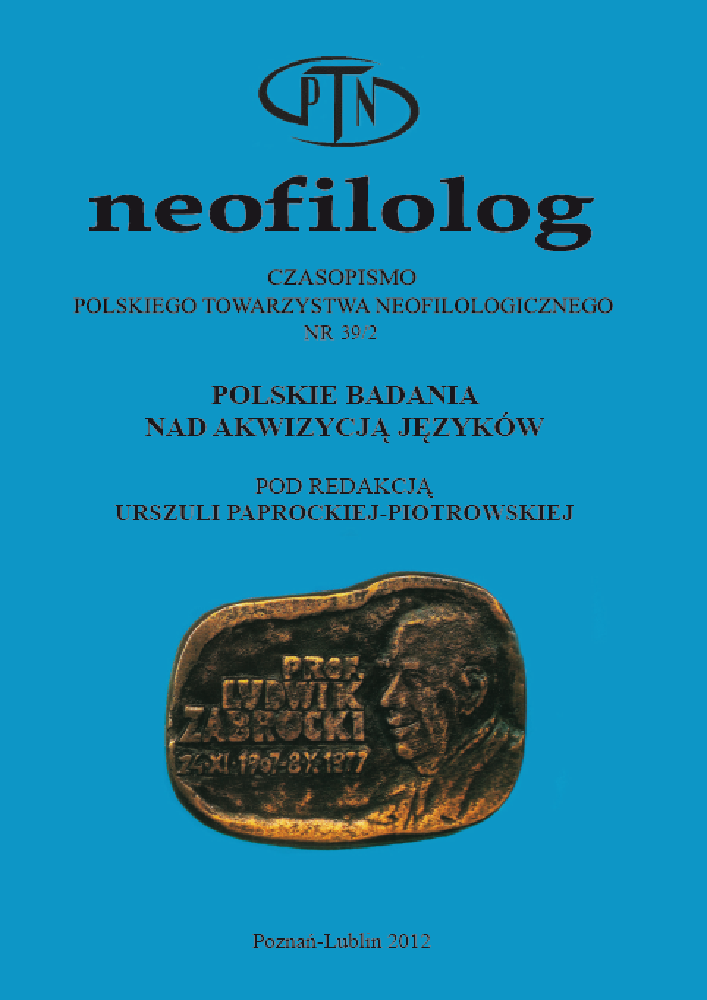Abstrakt
Traditional communication in foreign language classes, even if varied by the use of diverse games and simulations, takes place in a sterile classroom environment, and therefore, is rarely encouraging. However, the new generation of pupils is growing up on computer games, and this fact is changing their expectations and demands on education. The dynamically changing virtual world of videogames may be the perfect environment for them to develop various skills. In this paper, I would like to present my preliminary conclusions made while implementing videogames into foreign language classes in a high school.
Bibliografia
Błaszkiewicz, R. 2011. „Gry komputerowe a zdrowie dziecka w młodszym wieku szkolnym”. Nauczanie Początkowe XXXIV, 1: 34-43.
Cruz, J. Q. 2007. „Video Games and the ESL Classroom”. The Internet TESL Journal Vol. XIII, No. 3, http://iteslj.org/Articles/Quijano-VideoGames.html DW 13.09.2012.
deHaan, J. 2011. „Teaching and learning English through digital game projects”. Digital culture & education III, 1: 46-55.
Dylan, W. 2010. „Le rôle de l’évaluation formative dans les environnements d’apprentissage efficaces” (in) Comment apprend-on ? La recherche au service de la pratique (éd. H. Dumont, D. Istance et F. Benavides). Éditions OCDE: 143-169.
Gee, J. P. 2007. What video games have to teach us about learning and literacy. New York: Palgrave Macmillan.
Johnson, S. 2005. Everything bad is good for you: how today’s popular culture is actually making us smarter. New York: Riverhead Books.
King, A. 1993. „From Sage on the Stage to Guide on the Side”. College Teaching XXXXI, 1: 30-35.
Kotuła, K. 2012. „Gra komputerowa na lekcji języka obcego”. Języki Obce w Szkole 3: 122-124.
Kozieł, R. 2010. „Ewaluacja dydaktyzacji filmów w wybranych podręcznikach do nauki języka niemieckiego” (in) Materiały edukacyjne w nauczaniu języków obcych – teoria i praktyka (red. K. Droździał-Szelest). Gorzów Wielkopolski: Wyd. Państwowej Szkoły Zawodowej w Gorzowie Wielkopolskim: 71-78.
Krystalli, P. 2008. „Les jeux vidéo en classe de FLE” (in) Année européenne du dialogue interculturel: communiquer avec les langues-cultures. Actes du Congrès international. Université Aristote de Thessalonique: 336-348.
Li, Z., Liu, F. et Boyer, J. 2009. „Amusing Minds for Joyful Learning through E-Gaming” (in) Handbook of research on e-learning methodologies for language acquisition (éd. R. Marriott et P. Torres). Hershey: Information Science Reference: 132-150.
Loiseau, Y. 1997. „De l’incidence de l’espace et du temps dans l’enseignement/apprentissage des langues étrangères” (in) Le FLE, un métier, une passion: réflexions en didactologie des langues-cultures (éd. M.-A. Nachez et S. Roch-Veiras). Angers: Université Catholique de l’Ouest: 59-86.
Mawer, K. et Stanley, G. 2011. Digital play: computer games and language aims. Surrey: Delta Publishing.
Prensky, M. 2006. Don’t bother me Mom, I’m learning! How computer and video games are preparing your kids for twenty-first century success and how you can help! St. Paul: Paragon House.
Purushotma, R. 2005. „Commentary: You’re not studying, you’re just…”. Language Learning & Technology IX, 1: 80-96.
Ranalli, J. 2008. „Learning English with The Sims: exploiting authentic computer simulation games for L2 learning”. Computer Assisted Language Learning XXI, 5: 441-455.
Siek-Piskozub, T. 1995. Gry, zabawy i symulacje w procesie glottodydaktycznym. Poznań: Uniwersytet im. Adama Mickiewicza.
Siek-Piskozub, T. 2001. Strategia ludyczna w nauczaniu języków obcych, Warszawa: PWN.
Surdyk, A. 2008. „Klasyfikacja interakcji w grach typu role-playing games oraz relacje komunikacyjne i dydaktyczne w technice gier fabularnych”. Homo Communicativus IV, 2: 115-125.
Thomas, M. 2012. „Contextualizing Digital Game-Based Language Learning: Transformational Paradigm Shift or Business as Usual?” (in) Digital Games in Language Learning and Teaching (éd. H. Reinders). New York: Palgrave Macmillan: 11-31.
Licencja
Prawa autorskie (c) 2012 Krzysztof Kotuła

Utwór dostępny jest na licencji Creative Commons Uznanie autorstwa – Bez utworów zależnych 4.0 Międzynarodowe.
Przedstawiany utwór (artykuł) upubliczniany jest na podstawie umowy z autorem i na licencji Creative Commons Attribution-NoDerivatives 4.0 International (CC BY-ND 4.0).
Użytkownicy mają obowiązek podania wraz z rozpowszechnionym utworem, informacji o autorstwie, tytule, źródle (odnośniki do oryginalnego utworu, DOI) oraz samej licencji;
- bez tworzenia utworów zależnych,
- utwór musi być zachowany w oryginalnej postaci.
Uniwersytet im. Adama Mickiewicza w Poznaniu zachowuje prawo do czasopisma jako całości (układ, forma graficzna, tytuł, projekt okładki, logo itp.).
